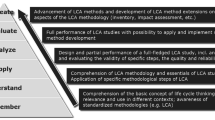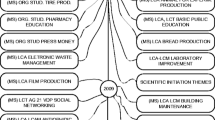Abstract
Purpose
In support of the sustainable development of our societies, future engineers should have elementary knowledge in sustainability assessment and use of life cycle assessment. Publications on pedagogical experience with teaching life cycle assessment (LCA) in high-level education are however scarce. Here, we describe and discuss 20 years of experience in teaching LCA at MSc level in an engineering university with the ambition to share our insights and inspire teaching of LCA as part of a university curriculum.
Methods
We detail the design of an LCA course taught at the Technical University of Denmark since 1997. The course structure relies on (i) a structured combination of theoretical teaching, practical assignments and hands-on practice on LCA case studies, and (ii) the conduct of real-life LCA case studies in collaboration with companies or other organisations. Through the semester-long duration of the course, students from different engineering backgrounds perform full-fledged LCA studies in groups, passing through two iterations—a screening LCA supporting a more targeted LCA.
Results and discussion
The course design, which relies on a learning-by-doing principle, is transparently described to inspire LCA teachers among the readers. Historical evolution and statistics about the course, including its 192 case studies run in collaboration with 105 companies and institutions, are analysed and serve as basis to discuss the benefits and challenges of its different components, such as the theory acquisition, the assignment work, the LCA software learning, the conduct of case studies, the merits of industrial collaborations and grading approaches.
Conclusions
We demonstrate the win-win situation created by the setting of the course, in which the students are actively engaged and learn efficiently how to perform an LCA while the collaborating companies often get useful insights into their analysed case studies. The course can also be an eye opener for companies unfamiliar with LCA, who get introduced to life cycle thinking and the potential benefits of LCA. We have no hesitation in recommending industries and LCA teachers to engage into such collaborations even in the fundamental teaching of LCA techniques.




Similar content being viewed by others
References
Baumann H, Tillman A-M (2004) The hitch hiker’s guide to LCA. An orientation in life cycle assessment methodology and application. Artikelnummer: 31027–01. Lund, Sweden: Studentlitteratur AB
Bishop JL, Verleger MA (2013) The flipped classroom: a survey of the research. In: Paper 6219 at the 120th American Society for Engineering Education (ASEE) Annual Conference and Exposition. Atlanta, USA
Bjørn A, Laurent A, Owsianiak M (2018) LCA report template (Chapter 38). In: Hauschild MZ et al (eds), Life cycle assessment: theory and practice. ISBN 978-3-319-56475-3. Springer, Dordrecht, pp 1051-1058
Bloom BS, Englehard MD, Furst EJ, Hill WH, Krathwohl DR (1956) Taxonomy of educational objectives: the classification of educational goals–handbook I: cognitive domain. N Y 16:207–244. https://doi.org/10.1300/J104v03n01_03
Boyle C (2004) Considerations on educating engineers in sustainability. Int J Sustain High Educ 5(2):47–155
Consoli F, Allen D, Boustead I, Fava J, Franklin W, Jensen A (1993) A code of practice. Guidelines for life-cycle assessment. Society of Environmental Toxicology and Chemistry (SETAC), Pensacola
Cooper JS, Fava J (2000a) Teaching life-cycle assessment at universities in North America. J Ind Ecol 3:13–17
Cooper JS, Fava J (2000b) Teaching life-cycle assessment at universities in North America, part II. J Ind Ecol 4:7–11
Curran MA (2012) Life cycle assessment handbook: a guide for environmentally sustainable products. Wiley-Scrivener Publishing LLC, Beverly, pp 640
Curran MA (2015) Life cycle assessment student handbook. John Wiley & Sons, Hoboken, pp 320
EC-JRC (2010) International Reference Life Cycle Data System (ILCD) handbook—general guide for life cycle assessment-detailed guidance, First edn. Publications Office of the European Union, Luxembourg. https://doi.org/10.2788/38479
EC-JRC (2011) International Reference Life Cycle Data System (ILCD) handbook—recommendations for life cycle impact assessment in the European context. Publications Office of the European Union, Luxembourg. doi:10.278/33030
Evans G, Galvin K, Doroodchi E (2008) Introducing quantitative life cycle analysis into the chemical engineering curriculum. Educ Chem Eng 3:e57–e65
Gilmore KR (2016) Teaching life cycle assessment in environmental engineering: a disinfection case study for students. Int J Life Cycle Assess 21:1706–1718
Goedkoop M, Heijungs R, Huijbregts MAJ, De Schryver AM, Struijs J, van Zelm R (2009) ReCiPe 2008-a life cycle impact assessment method which comprises harmonised category indicators at the midpoint and the endpoint level. First edition-report I: characterisation. Ministry of Housing, Spatial Planning and Environment, the Netherlands. Available at: https://www.rivm.nl/en/Topics/L/Life_Cycle_Assessment_LCA/Downloads. Accessed 15 Jan 2018
Guinée JB, Gorrée M, Heijungs R, Huppes G, Kleijn R, de Koning A, van Oers L, Sleeswijk AW, Suh S, Udo de Haes HA, de Bruijn H, van Duin R, Huijbregts MAJ (2002) Handbook on life cycle assessment. Operational guide to the ISO standards. I: LCA in perspective. IIa: guide. IIb: operational annex III: scientific background. 708 pp. Kluwer Academic Publishers, Dordrecht ISBN: 1-4020-0557-1
Hauschild MZ, Bjørn A (2018) LCA Cookbook (Chapter 37). In: Hauschild MZ et al (eds) Life cycle assessment: theory and practice. ISBN 978-3-319-56475-3. Springer, Dordrecht, pp 963–1048
Hauschild MZ, Potting J (2005) Spatial differentiation in life cycle impact assessment—the EDIP2003 methodology. Danish Environmental Protection Agency, Copenhagen
Hauschild MZ, Wenzel H (1998) Environmental assessment of products. Volume 2—scientific background. Chapman & Hall, Thomson Science, London 0-412-80810-2
Hauschild MZ, Laurent A, Mølgaard C, Walachowicz F (2012) Learning by doing—bringing real-life case studies into the classroom. Oral session presented at SETAC Europe 18th LCA Case Study Symposium–Sustainability assessment in the 21st century, 26-28 November 2012, Copenhagen, Denmark
Hauschild MZ, Goedkoop M, Guinée J, Heijungs R, Huijbregts MAJ, Jolliet O, Margni M, De Schryver A, Humbert S, Laurent A, Sala S, Pant R (2013) Identifying best existing practice for characterization modelling in life cycle impact assessment. Int J Life Cycle Assess 18:683–697
Hauschild MZ, Rosenbaum RK, Olsen SI (2018) Life cycle assessment: theory and practice. ISBN 978-3-319-56475-3. Springer, Dordrecht
Heijungs R, Suh S (2002) The computational structure of life cycle assessment. Computation structure of LCA. Kluwer Academic Publishers, Dordrecht ISBN 1-4020-0672-1
Herreid CF, Schiller NA (2013) Case studies and the flipped classroom. J Coll Sci Teach 42:62–66
Huijbregts MAJ, Steinmann ZJN, Elshout PMF, Stam G, Verones F, Vieira MDM, Hollander A, Zijp M, van Zelm R (2016) ReCiPe 2016. A harmonized life cycle impact assessment method at midpoint and endpoint level. Report I: characterization. RIVM Report 2016-0104. Bilthoven, The Netherlands. Available at: https://www.rivm.nl/en/Topics/L/Life_Cycle_Assessment_LCA/Downloads. Accessed 31 Jan 2018
Huijbregts MAJ, Steinmann ZJN, Elshout PMF, Stam G, Verones F, Vieira M, Zijp M, Hollander A, van Zelm R (2017) ReCiPe 2016: a harmonised life cycle impact assessment method at midpoint and endpoint level. Int J Life Cycle Assess 22:138–147
ISO (2006) ISO14044:2006- environmental management - life cycle assessment—requirements and guidelines. International Organization for Standardization, Geneva
Jolliet O, Margni M, Charles R, Humbert S, Payet J, Rebitzer G (2003) Presenting a new method IMPACT 2002+: a new life cycle impact assessment methodology. Int J Life Cycle Assess 8:324–330
Jolliet O, Saadé-Sbeih M, Shaked S, Jolliet A, Crettaz P (2016) Environmental life cycle assessment. Taylor & Francis Group, Boca Raton
Klopffer W, Grahl X (2014) Life cycle assessment—a guide to best practice. Wiley-VCH, Weinheim
Laurent A, Olsen SI, Fantke P, Andersson PH (2015) Active learning in sustainability teaching. ETALEE conference, exploring teaching for active learning in engineering education, 11–12 November 2015. DTU Skylab, Kongens Lyngby, pp 77–78
Lin K, Levan A, Dossick C (2012) Teaching life-cycle thinking in construction materials and methods: evaluation of and deployment strategies for life-cycle assessment in construction engineering and management education. J Prof Issues Eng Educ Pract 138:163–170
Lindfors L-G, Christiansen K, Hoffman L, Virtanen Y, Junttila V, Hanssen O-J et al. (1995) Nordic guidelines on life-cycle assessment. Nord 1995:20. Nordic Council of Ministers, Copenhagen
Mälkki H, Alanne K (2017) An overview of life cycle assessment (LCA) and research-based teaching in renewable and sustainable energy education. Renew Sust Energ Rev 69:218–231
Masanet E, Chang Y, Yao Y, Briam R, Huang R (2014) Reflections on a massive open online life cycle assessment course. Int J Life Cycle Assess 19:1901–1907
Matthews HS, Hendrickson CT, Matthews DH (2015) Life cycle assessment: quantitative approaches for decisions that matter. Retrieved from http://www.lcatextbook.com/. Accessed 20/05/2017
NCM (1992) Product life cycle assessment: principles and methodology (environment). Nordic Council of Ministers (NCM), Copenhagen
Olsen SI (2010) A strategy for teaching sustainability assessment. In: Proceedings of the 3rd International Symposium for Engineering Education ISEE2010: Educating Engineers for a changing world. University College Cork, Ireland, pp 581–588
Owsianiak M, Bjørn A, Bugge HB, Carvalho SM, Jebahar L, Rasmussen J, White CM, Olsen SI (2018) Illustrative case study: life cycle assessment of four window alternatives (Chapter 39). In: Hauschild MZ et al (eds) Life cycle assessment: theory and practice. ISBN 978-3-319-56475-3. Springer, Dordrecht, pp 1059–1146
Taylor A (2015) Flipping great or flipping useless? A review of the flipped classroom experiment at Coventry University London Campus. J Pedagog Dev 5:57–65
UNEP (1996) Life cycle assessment: what it is and how to do it. UNEP, New York 90 pp
University of Sydney (2018) Guidance for implementing group work in courses. Section “Group size”. Available at: http://sydney.edu.au/education_social_work/groupwork/implement/prepare/size.shtml. Accessed 17 Jan 2018
Weidema B (1997) Guidelines for critical review of product life cycle assessments. SPOLD, Brussels 14 pp
Wenzel H, Hauschild MZ, Alting L (1997) Environmental assessment of products. Volume 1—methodology, tools and case studies in product development. 544 pp. Chapman & Hall, United Kingdom. Kluwer Academic Publishers, Hingham ISBN 0 412 80800 5
Wenzel H, Caspersen N, Schmidt A (2000) Product life cycle check—a guide. Special edition adapted for DTU course 42372. Translated from Danish and adapted by Molin C, Hauschild MZ, Nielsen P, Buckley C, Olsen SI, Frees N, Wenzel H, Caspersen N, Schmidt A. Institute for Product Development, Technical University of Denmark, Kgs. Lyngby, Denmark
White P, Schenck R (2014) Environmental life cycle assessment—measuring the environmental performance of products. American Center for Life Cycle Assessment, Vashon Island ISBN: 978-0-9882145-6-9
Author information
Authors and Affiliations
Corresponding author
Additional information
Responsible editor: Greg Thoma
Electronic supplementary material
ESM 1
(DOCX 501 kb)
Rights and permissions
About this article
Cite this article
Cosme, N., Hauschild, M.Z., Molin, C. et al. Learning-by-doing: experience from 20 years of teaching LCA to future engineers. Int J Life Cycle Assess 24, 553–565 (2019). https://doi.org/10.1007/s11367-018-1457-5
Received:
Revised:
Accepted:
Published:
Issue Date:
DOI: https://doi.org/10.1007/s11367-018-1457-5




